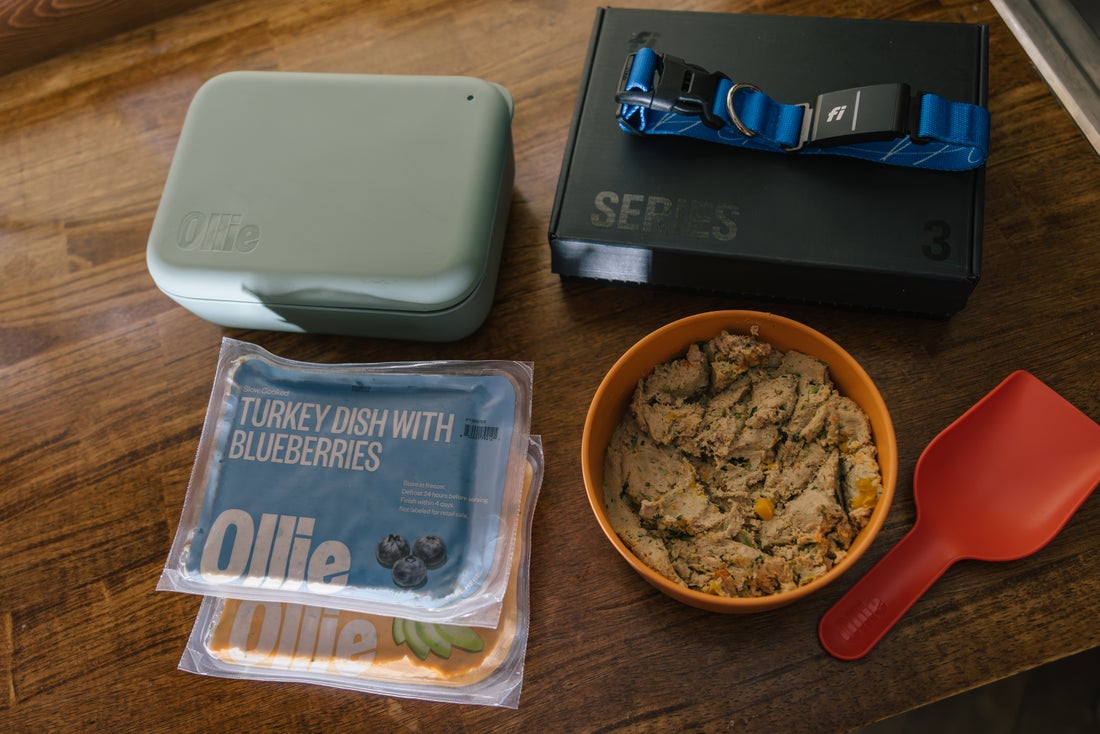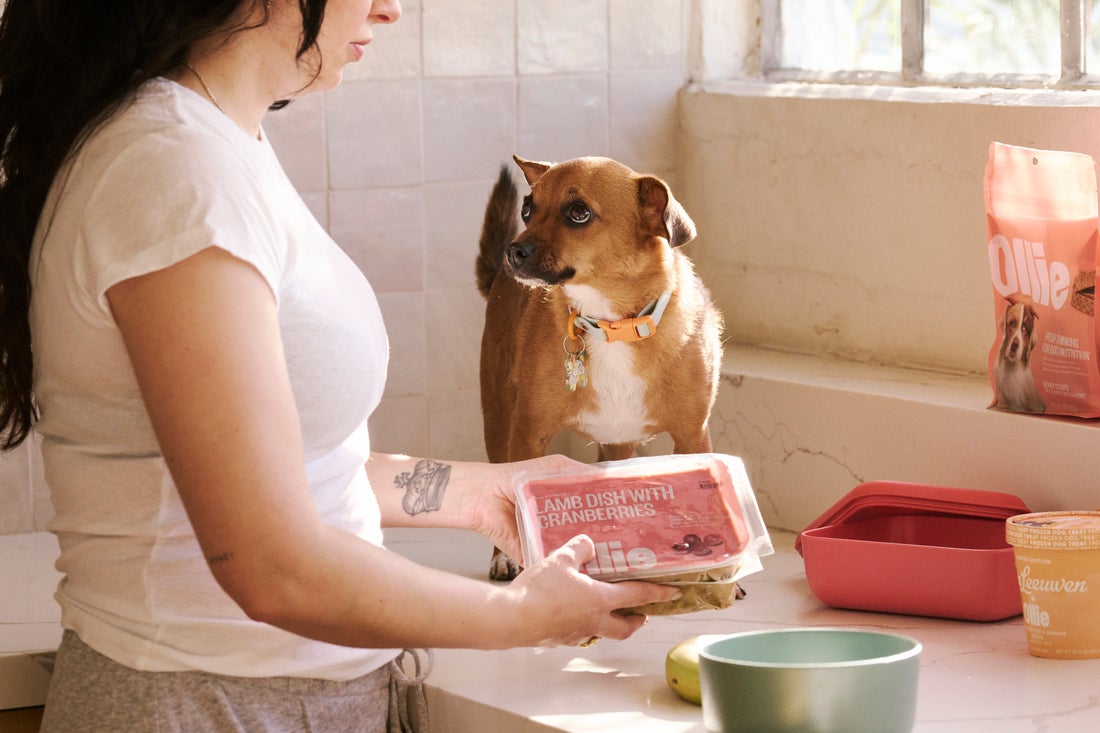Hey Ollie blog readers! We’re offering you an exclusive 60% OFF your starter box! Try now!
As a dog mom or dad, you’ve got enough to worry about when it comes to foreign objects your pup may or may not have ingested on one of their walks (did Daisy just swallow a straw?!) You shouldn’t have to worry about their toys, too—but some aren’t made with your dog’s health in mind—unfortunately, the same goes for some treats! Here’s how to make sure your pup stays safe:
Chemicals in Toys
Even though we treat our pups like our kids, their toys are not regulated the same way children’s toys are so it’s crucial to do your homework. Lead is one dangerous material you need to be on the lookout for: The Air Kong Squeaker, the Hartz Flexa-Foam Round About Elephant and the Nylabone Double Action Chew are all non-toxic and lead-free.
Surprisingly, you need to be more cautious about tennis balls: in one study, 48 percent of the balls tested contained detectable levels of lead. Researchers discovered that ones made specifically for pets were more likely to contain lead than “sports” tennis balls. The lettering on one “pet” tennis ball, for example, contained 2,696 ppm of lead and 262 ppm of arsenic, a known human carcinogen.
Your best bet? Research companies that make non-toxic toys for pets, like Planet Dog and West Paw. By supporting smaller companies with responsibly created products (that are also eco-friendly), more pet toys will follow suit.
Foreign Body Obstructions
Dogs can end up swallowing almost anything—including their toys! Sometimes it passes (you know what that means) and sometimes you have to visit the vet. It can seem almost impossible to stop dogs from chomping on everything, but there are some rules of prevention that can help:
If your dog is chewing a toy or treat, be present and keep an eye on them. Avoid keeping “moisture-swollen” (also known as "ABC" or already been chewed) chewy sticks and toys around. Just like with kids, watch out for choking hazards and limit your dog’s interaction with these no-no’s as best you can. If you suspect your pet has been poisoned, or may have swallowed something she shouldn’t have, get to the vet immediately. Signs include gagging, vomiting, repeated swallowing; drooling, diarrhea, with or without blood, fever, lack of energy or lethargy, signs of pain, refusal to eat, or weight loss and pale gums.
The Rawhide Debate
This is a hotly debated topic in the dog food world: If the rawhide you’ve chosen isn’t treated with over-processed, toxic chemicals, it can be safe depending on your pup’s chewing style. Since rawhide is meant to be a long-lasting chew that slowly softens and then breaks down, it is considered safe for “soft chewers.” If your dog is a “heavy chewer,” they’re more likely to be able to break off large chunks of the rawhide and swallow it, which can cause choking and even intestinal blockage.
Even beyond that, rawhide is still a controversial pet chew: It can be a byproduct of leather, or linked to the international fur trade, rather than a humanely sourced meat product. In recent years, viral videos detailing how rawhide is made show many sources treat the hide with toxic chemicals in facilities that endorse questionable practices. Our final verdict is to stay safe by steering clear!
Dog Treat Recalls
Just like dog food, treats can be made with unhealthy, dangerous ingredients that can be poisonous or even cause death. There are a few ways to make sure they’re safe for your pup: first, always read the label! You want to avoid the common marketing traps and terms. And keep an eye on dog food recalls just in case there’s a treat recall too.
Again, just like dog food, natural, human-grade treat ingredients are healthiest for your pup. We make our snacks with human-grade single ingredients like USDA-regulated chicken, beef, turkey and sweet potatoes. Making your own treats is another great way to guarantee they’re safe to eat. And there’s always the healthy option of giving your pup a fresh carrot or blueberry!
If you suspect your dog has been poisoned or has swallowed their toy, call your veterinarian or the Pet Poison Helpline (855-764-7661) immediately. The sooner a pup who has been poisoned is diagnosed, the easier treatment is, and it can save your pet’s life. Of course, having health insurance for your pup ensures you’re prepared to pay for the worst case scenario (which hopefully never happens!)
Content provided by Healthy Paws Pet Insurance. Healthy Paws is one of the leading pet insurance program providers in the U.S. for dogs and cats, and is ranked #1 by customers on leading review websites. Click here to get 10% off Healthy Paws pet insurance!
(Policies are underwritten and issued by ACE American Insurance Company, Indemnity Insurance Company of North America, ACE Property & Casualty Insurance Company, Atlantic Employers Insurance Company, members of the Chubb Group.)
Tagged As:

The nutrition your dog needs,
the food they want.

Enjoying our articles? Subscribe our Newsletters and get new articles directly to your inbox
You might also like
18 September 2025
5 MINS READ
Can I Rotate Fresh Dog Food Flavors?
Yes, it’s safe to rotate fresh dog food flavors, and many dogs actually benefit from the variety. At Ollie, we offer multiple fresh recipes, like Beef, Chicken, Turkey, Lamb, and Pork so you can…
by Ollie Pets
18 September 2025
5 MINS READ
Is Fresh Dog Food Safe During Power Outages?
Fresh dog food is only safe during a power outage if it has stayed cold, specifically, below 40°F. Once the temperature rises above that point, bacteria can start to grow, and the food may no lon…
by Ollie Pets
18 September 2025
5 MINS READ
How Do I Store Fresh Dog Food While Traveling?
If you’re bringing fresh dog food on the road, keeping it cold is key. The best way to store it is in a cooler with ice packs or a travel freezer. At Ollie, our vacuum-sealed fresh food stays good…
by Ollie Pets







